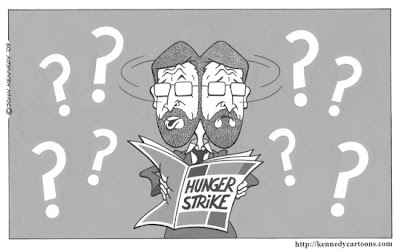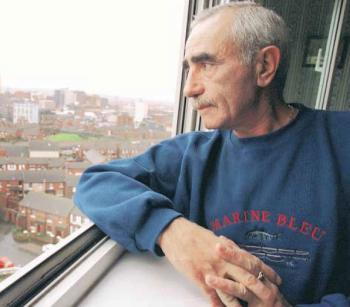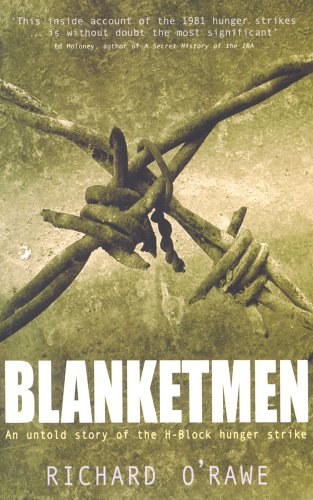Friday, October 02, 2009
1981 Hunger Strike: Feint and Retreat
Rusty Nail at Slugger O’Toole
This afternoon we’ll be looking at Laurence McKeown’s Irish News piece, in a ‘fisky’ sort of way. Other articles are in the works to be looked at. It may be that some of the material will be revisited at a later date.
To begin with today’s piece, former hunger striker Laurence McKeown wrote: “When O’Rawe first made the claim that the British had been prepared to reach a deal during the 1981 Hunger Strike but that it was rejected by the leadership of the republican movement, I believed the claim to be totally unfounded. I still believe that. In the intervening period it has been disproved by documentation from the period and by a broad spectrum of individuals involved at the time.”
What documentation is he referring to? Where has the claim been disproved by the documentation he is referring to?
Who makes up the broad spectrum of individuals?
Slugger has followed this issue very closely and is left baffled at this. The documentation in the public domain supports O’Rawe’s claim – it doesn’t in any manner disprove it. The ‘broad spectrum’ consensus – at least as broad as it can be made up of former prisoners (hunger strikers and blanketmen), their family members, members of the ICJP, the Mountain Climber link who delivered the offer and refusal (and verified the FOI documentation), and even the Taoiseach of the time, who, in the same issue as McKeown’s article, says, “O’Rawe’s account seems to me to be, within his framework of knowledge, honest and accurate.” – is not that the claim has been disproven, but that it is very much a valid claim that needs explained by those responsible.
And that’s just taking apart the first paragraphs of McKeown’s piece – he’s off to a bad start. Unless he will show us this documentation he refers to, and quote the broad spectrum of individuals to support his case?
We should be so lucky. Instead of expanding on his evidence of O’Rawe’s claims being disproven, he veers off into shooting the messenger. It’s all a political conspiracy, he says, dragging out the usual bogeymen out to get poor Sinn Fein. Why, those disaffected bogeymen are just like alcoholics – you can’t tell them anything – “So why bother?” he posits.
Like O’Rawe, who in his article explains that seeking the truth is “a sacred duty”, McKeown too feels dutybound, to the families of the hunger strikers and “the thousands of ordinary people who did so much for us”.
He paints another hypothetical – that the Brits, if we accept that they were offering concessions, then walked away with their tail between their legs instead of going to the Irish, the Church and the SDLP to make public their offer and force the hunger strikers down that way. First off, they didn’t walk away with their tail between their legs at the refusal of Adams over the early July offer. They came back to Adams in the last half of July attempting once again to come to agreement, and again, the Adams committee refused them. The Red Cross was also sent in to attempt to mediate; they were rebuffed and quickly sent packing. The Adams committee had Thatcher over a barrel in one regard – she could not be seen to be negotiating with the IRA. Were she to make public that she was actively attempting to end the hunger strike by directly negotiating with Gerry Adams, her government would have been in severe difficulties. It would have also impacted relations with the Irish government. So those defending the traditional Adams narrative of the hunger strike can use the question of “Why didn’t she go public” as a shield to hide behind as they know very well that was never on the cards. Had they gone to the media, as McKeown suggests, Thatcher would have been savaged. Was she willing to sacrifice herself and her government in order to end the hunger strike? McKeown can’t have it both ways. She wanted an end to the hunger strike, and did take risks to bring it about, but she wasn’t about to commit public political suicide in order to do so – and no one was under any illusions that she was. So there is a safety in suggesting she would as a defence tactic now.
Even to this day the NIO will not release all documents relating to the hunger strike because of the damage it could do to people still active in politics today. When the British are done with the Sinn Fein leadership and have no further need to protect them, then those secrets will be made public. Adams’ proxies can ask why they aren’t made public today safe in the knowledge that as long as he is useful to them, they will never be released.
McKeown argues that the idea that Thatcher was negotiating with the IRA would have set off the prison authorities too much, and that is his reason for why the O’Rawe claims aren’t true. He cites a discussion with an un-named BBC producer as evidence for this. This discussion has been previously cited by McKeown in R.K. Walker’s 2006 book on the hunger strike, although the context used then is in reference to the first hunger strike, not the second. On page 79, McKeown describes the ending of the first hunger strike:
Released from Long Kesh in 1992, he sheds further light on the feeling among Republicans that during the first hunger strike of 1980 the British authorities had no intention of making a genuine attempt to reach a compromise. He recalls:
“It was said by the British [to Cardinal Ó Fiach and others] that once the strike was ended, there would be concessions on at least the wearing of our own clothes, as opposed to prison uniform. Ó Fiach had appealed to the hunger strikers and to the British government to call off the strike. He thought he had an understanding that our own clothes would be acceptable. And this was the understanding of Republicans at the time. So our relatives brought our own clothes up to the prison to leave in for us to wear, thinking that that was what had been agreed. But instead we were told that we couldn’t wear them, and that we would have to wear “prison-issue civilian clothing”, which was not what had been agreed at all.
Many years later, during the making of a documentary on Ireland by the BBC, the BBC producer said off-screen that he’d been told by someone who’d been in official circles at the time that six NIO officials including the prison governor had threatened to resign if the prisoners had been given any concessions at all.” pg 79, The Hunger Strikes, R. K. Walker
Leaving aside the nonsense of the first paragraph, compare this with Monday’s article, where McKeown uses the same example in a different context:
“A BBC Timewatch programme produced in 1994, a full 11 years before Richard O’Rawe’s claim, possibly holds the answer.
I did an interview for the programme and the producers got access to many senior British government officials from the time.
In casual conversation with the producer I asked if the civil servants, particularly in the Northern Ireland Office (NIO), had felt a bit like ‘piggy-in-the-middle’, forced to hold to Thatcher’s uncompromising line while having to deal with adverse publicity from around the world.
The producer replied that everything they had discovered indicated that Thatcher at one point was going to make concessions but that when the Northern Ireland Office (NIO) got wind of it top civil servants, including the governor of the prison, Stanley Hilditch, threatened to resign.
As soon as he said it I realised it made absolute sense. Of course the civil servants in the NIO (unionists) would be more opposed to any concessions to republican prisoners than the British would.”
But it makes sense only to a certain point – because this ‘rebellion’ took place in the context of the first hunger strike, not the second, and Thatcher most certainly learned from this, as the FOI documentation shows. She made sure that the line would be held the second time around, not only by getting Atkins’ assurances, but by moving both Atkins and Hilditch out of their positions – to be replaced by Prior and Kerr – as the hunger strike was winding down and the concessions she had offered were ultimately implemented. She wasn’t looking a third hunger strike. As has been said by other British officials of the ending of the first hunger strike, with a little imagination from the prison authorities the second hunger strike could have been averted. They rebelled, and made it inevitable. Thatcher wasn’t going to give them a second chance.
McKeown writes –
“So, the producer of the programme added, threatened with rebellion on their doorstep it appears the British government decided it best to weather the storm (of the Hunger Strike) rather than follow through with their ‘offer’.”
10 Downing Street, in the FOI documents, discussing the second July offer, answers both of these hypotheticals:
“The Prime Minister asked whether a detailed offer along the lines set out above were made and failed, he could hold the prison officers. Mr Atkins thought that this would be just about possible. The Prime Minister pointed out that once the offer of own clothes had been made publicly, it would have to be implemented whether or not the hunger strikers called off their strike. Mr Atkins agreed. After further discussion, the Prime Minister decided that the dangers in taking an initiative would be so great in Northern Ireland that she was not prepared to risk them. The official who went into the prison could repeat the Government’s public position but could go no further. The Secretary of State agreed.”
What is being discussed is how far to go without Adams indicating that the offer would be accepted. Thatcher asks would the prison officers comply with the offer’s terms; Atkins assures her they would. She reminds him of the clothes issue, making the point because of the previous problem. In the end she decides that going public with the full offer without the acceptance from Adams was too risky; she can go no further without it.
It was choreography she was seeking, and Adams was, at that date, unwilling to give it to her.
McKeown says the hunger strikers weren’t going to agree: “And given that four comrades had already died and the hunger strike of 1980 had ended with not the merest crumb of concession there was no way we were ending ours without a concrete, copper-fastened deal witnessed by guarantors who could stand over it.”
Yet, as we know, the first hunger strike ended with no chance of concessions; the potential guarantors of the second hunger – the ICJP and the Red Cross – were chased, on order from McFarlane. The hunger strikers themselves weren’t given a chance to agree to Thatcher’s proposals – they were told nothing of them. Those who were – O’Rawe and McFarlane – were over-ruled when they accepted them.
What is most interesting about McKeown’s effort here isn’t his use of hypothetical bollocks to bamboozle, but what he left out, the position he abandoned. One would imagine that he would have been in the perfect position to kick the ball into touch and yet he refuses point blank to go near it this time around.
When O’Rawe’s book was released, McKeown had written, in an attempt to rubbish the claims: “Strangely, there was nothing new to me regarding what was on offer from the Brits back in 1981. Whether it was the ‘Mountain Climber’ or the Irish Commission for Justice and Peace, we wanted definite confirmation, not vague promises of ‘regime change’.” – 10 March, 2005, An Phoblacht
This comment is also referred to in an article for the Village magazine: “Laurence McKeown, whose family took him off the hunger strike, has denounced O’Rawe and accused him of glory-seeking. No concrete promises were on offer from the British, he insists.” H-Block hypocrisy, Village, Saturday, 12 March 2005
Today, 2009, we now know that much more than “vague promises” were on offer; we have the “concrete promises” confirmed and verified by the man who delivered them to Martin McGuinness.
McKeown’s retreat, along with Morrison’s and McFarlane’s absence and Adams’ continued silence, is noted.
Sourced from Slugger O’Toole






 It has withstood the blows of a million years, and will do so to the end.
It has withstood the blows of a million years, and will do so to the end.